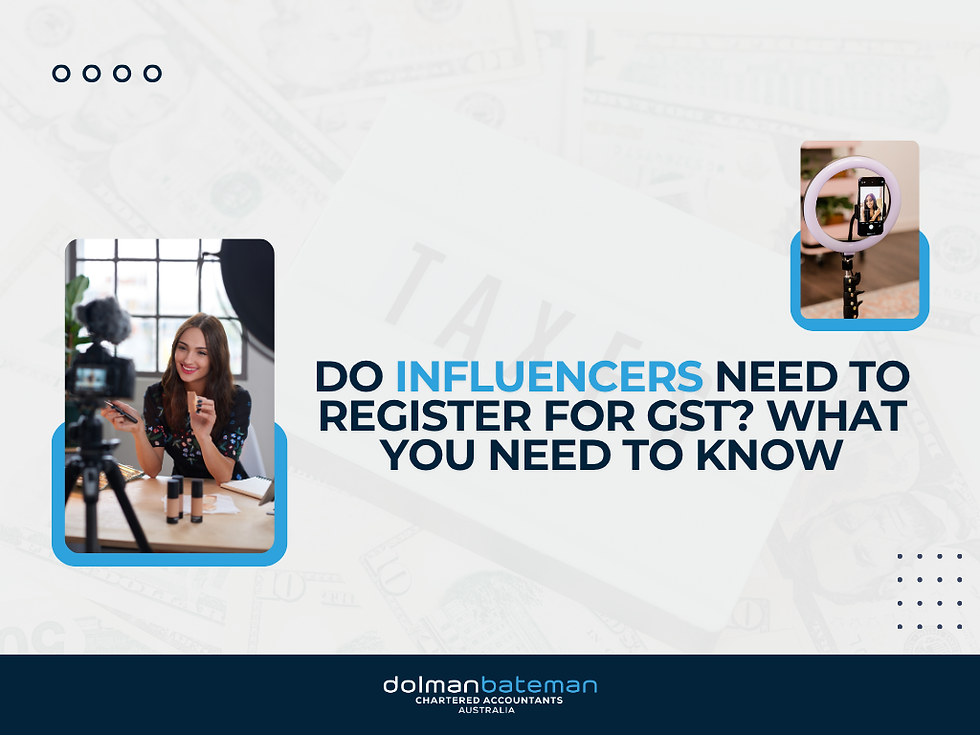Do Influencers Need to Register for GST? What You Need to Know
- Jenine L.
- Aug 6, 2025
- 3 min read
Updated: Jan 21

As an Instagram influencer, you might already know you need an ABN if you're earning money through brand deals, ads, or sponsored content. But what about GST?
Many content creators are surprised to learn that once they cross the $75,000 local and international annual income threshold, they’re legally required to register for Goods and Services Tax (GST) and charge GST on their services.
Let’s break down what that means for you, and how to stay compliant with the ATO.
What is GST and Why Does It Matter to Influencers?
GST (Goods and Services Tax) is a 10% tax added to the price of most goods and services in Australia. If you're running a business and earn more than $75,000 per year, the ATO requires you to:
Register for GST
Charge 10% GST on applicable Australian services
Lodge a Business Activity Statement (BAS), usually quarterly
Pay collected GST to the ATO
For influencers, this applies to Australian services such as:
Sponsored posts
Story promotions
Reels or TikToks created for brands
UGC (user-generated content)
Event appearances
Affiliate marketing income (if connected to your Australian business)
When Must an Influencer Register for GST?
You must register for GST if your gross business income (GST turnover) exceeds $75,000 per financial year. This includes:
Cash payments from brand collaborations
Payments received through agencies or influencer platforms
Product-based barter deals (valued at market price)
Ad revenue or affiliate income if it forms part of your Australian-based enterprise
Important: You need to register once you expect to exceed $75,000, not just after you do. Waiting too long can lead to backdated obligations, interest, and penalties.
Do You Charge GST on Sponsored Posts?
Yes, if you're registered for GST, you must add 10% GST to invoices for Australian businesses paying you for promotional services. You then report and pay this GST in your quarterly BAS.
Example:
A brand agrees to pay $1,000 for a story post.
You invoice: $1,000 + $100 GST = $1,100 total.
You remit the $100 GST to the ATO through your BAS.
If the brand is overseas, GST may not apply if the service is considered an export. Whether GST is applicable depends on where the benefit of your service is received. Always seek advice when dealing with international contracts.
What If You Don’t Register for GST?
If you:
Earn over $75,000 and don’t register, or
Continue invoicing without charging GST when required,
…the ATO may backdate your GST registration, demand unpaid GST, issue fines, and apply interest. You’ll also miss out on GST credits for business expenses like camera gear, software, advertising, and mobile costs.
Benefits of Registering for GST (Even If You’re Close to the Threshold)
Reputation: Brands and agencies often prefer working with GST-registered creators
GST Credits: Claim back GST on eligible business purchases
Compliance: Avoid penalties, interest, and stress from ATO audits
What Do You Need to Do?
Check your income, if you’re approaching $75K, it’s time to act
Register for GST via the Australian Business Register
Update your invoices to include GST
Lodge your BAS quarterly (or annually if eligible)
Use accounting software or an advisor to track income and expenses accurately
Don’t Leave It Too Late, Sort GST Early
At Dolman Bateman, we help influencers and digital creators structure their business properly, manage ABN and GST registration, and prepare BAS lodgements with accuracy, so you can focus on growing your audience, not fearing the ATO.
📞 Book a free consultation today to get clarity on your tax and GST obligations.
Disclaimer:
The information provided in this article is general in nature and does not constitute personal financial, legal or tax advice. All content relates to the current financial year only. Future changes to tax laws, thresholds or administrative requirements may affect the accuracy or relevance of this information, so you should always confirm that the guidance remains current. While every effort has been made to ensure accuracy at the time of publication, Dolman Bateman accepts no responsibility or liability for any loss or damage arising from reliance on this information. You should seek professional advice tailored to your circumstances before making any financial or tax decision.

